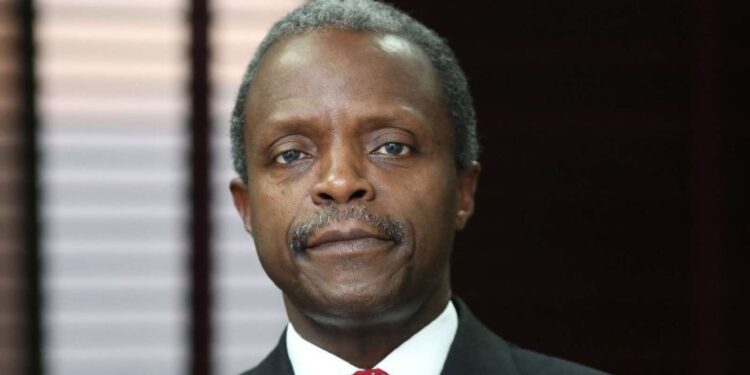The Vice President, Prof. Yemi Osinbajo (SAN) has said that the endorsement of virtual court proceedings by a recent Supreme Court ruling is wise decision. He said the decision has saved “our system of justice another catastrophic round of technical decisions around the constitutionality of virtual proceedings”, among other issues.
The Vice President stated this on Thursday at a webinar on media coverage of virtual court proceedings in Nigeria, organized by the Gavel International Limited. He however remarked that Practice directions for different levels of court may have to indicate how and in what order invitations would be issued especially to the public.
According to Prof. Osinbajo, “we are at a point where at least we know that virtual hearings are legal. “This means that the Supreme Court is satisfied that appropriate means can be found to ensure that hearings are public and that the press and indeed members of the public can access the proceedings.
“I think that an opportunity that this offers us is to get rid of this issue of technicality as much as possible. “And I am so pleased that the Supreme Court did not even hesitate in saying that virtual proceedings are legal. “It is really a breath of fresh air considering the ways that we tend to magnify the issue of technicality to the point where you wonder where justice is.”
The Vice President further: “I am hoping that the opportunity we have in virtual proceedings will also be an opportunity to dispense with several of the unnecessary technical rules that we have in our adjectival law, laws of procedure, evidence and all that.
”And hopefully, we are able to get to the heart of trials and the heart of the matter such that we are buck down unnecessarily by technicality”, he added. The Vice President said reporting of court proceedings is a crucial exercise of the right to fair hearing, a cornerstone of which is that hearings must be held in public. “How that right will be given full expression when court proceedings are within the encrypted confines of virtual platforms is really the subject of our conversion today”, he said.
According to him: “the Attorneys General of Lagos and Ekiti States deserve our commendation for bringing the matter before the Supreme Court. They asked the court to determine whether having regard to the constitutional requirement that court proceedings, save for some exceptions, must be held in public and whether court hearings by the use of technology, by remote hearings of any kind, whether Zoom or WhatsApp, Microsoft Themes, Skype or any other audio-visual or video-conference platform are constitutional.
“The Supreme Court, while dismissing the suits themselves as premature and speculative nevertheless said that as things stood today virtual proceedings were Constitutional. “This wise approach of the Court probably saved our system of justice another catastrophic round of technical decisions around the constitutionality of virtual proceedings.
“It may also be cautiously taken as a signal that the Supreme Court expects the lower courts to go down this new path with as little attention to technicality as possible.
“So, we are at a point where at least we know that virtual hearings are legal. This means that the Supreme Court is satisfied that appropriate means can be found to ensure that hearings are public, and that the press and indeed members of the public can access the proceedings.
“The technical issues around this are straightforward enough. If for example, the Zoom platform is the preferred option, the host, the registrar of the court will simply invite the press by making available the relevant coordinates of the meeting to enable the press (not just the print media) log on to the proceedings.
“Just as the physical court can only sit a determined number of persons so the virtual court, depending on the platform being used, would probably have a stated number of persons who can access the proceedings”, he stated.
In his contribution,activist lawyer Femi Falana (SAN) said that the Supreme Court ruling has established the legal validity of virtual court proceedings. Falana said what remains to be done is for government to put in place necessary machineries to facilitate a successful virtual court regime in the country.
He urged the judiciary to take advantage of intervention fund being disbursed across the country by the Central Bank of Nigeria (CBN) to equip the sector technologically, noting that of the N360 billion disbursed so far to different sector, not a kobo has been disbursed to the judiciary. He regretted that at the moment, the judiciary lacked the fund to train judges, lawyers and equip the courts technologically.
Falana deplored the fact that the Justice Ayo Salami Commission investigating former acting chairman of EFCC, Ibrahim Magu is sitting in camera. He contended that stakeholders should demand that the commission sit in the open saying that the issues involve are matters that concern every Nigerian.
Former General Secretary of the Nigerian Bar Association (NBA) Dele Adesina (SAN) remarked that COVID-19 brought technology and other innovations into our lives and that it would continue to grow in that order. Adesina said the country now need a well coordinated technological judicial system to be driven by the National Judicial Council (NJC) and the Chief Justice of Nigeria (CJN) to guide virtual hearing and coverage of proceedings.
He noted that this would not just require journalistic or judicial approach but technological approach.



































